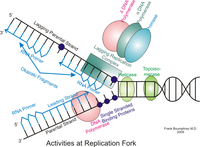
Photo from wikipedia
Heterozygous somatic mutations in spliceosome genes (U2AF1, SF3B1, ZRSR2, or SRSF2) occur in >50% of patients with myelodysplastic syndrome (MDS). These mutations occur early in disease development, suggesting that they… Click to show full abstract
Heterozygous somatic mutations in spliceosome genes (U2AF1, SF3B1, ZRSR2, or SRSF2) occur in >50% of patients with myelodysplastic syndrome (MDS). These mutations occur early in disease development, suggesting that they contribute to MDS pathogenesis and may represent a unique genetic vulnerability for targeted therapy. Here, we show that RNA splicing perturbation by expression of the U2AF1(S34F) mutant causes accumulation of R loops, a transcription intermediate containing RNA:DNA hybrids and displaced single-stranded DNA, and elicits an ATR response. ATR inhibitors (ATRi) induced DNA damage and cell death in U2AF1(S34F)-expressing cells, and these effects of ATRi were enhanced by splicing modulating compounds. Moreover, ATRi-induced DNA damage was suppressed by overexpression of RNaseH1, an enzyme that specifically removes the RNA in RNA:DNA hybrids, suggesting that the ATRi sensitivity of U2AF1(S34F)-expressing cells arises from R loops. Taken together, our results demonstrate that ATR may represent a novel therapeutic target in patients with MDS carrying the U2AF1(S34F) mutation and potentially other malignancies harboring spliceosome mutations.Significance: This study provides preclinical evidence that patients with MDS or other myeloid malignancies driven by spliceosome mutations may benefit from ATR inhibition to exploit the R loop-associated vulnerability induced by perturbations in splicing. Cancer Res; 78(18); 5363-74. ©2018 AACR.
Journal Title: Cancer research
Year Published: 2018
Link to full text (if available)
Share on Social Media: Sign Up to like & get
recommendations!